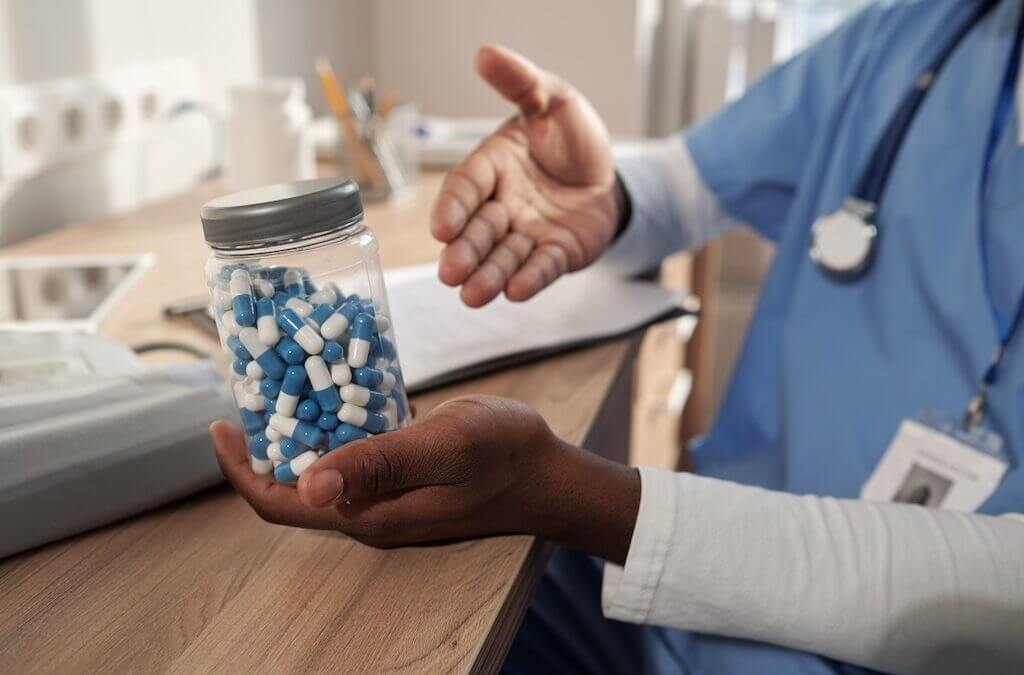How to handle medication errors in care settings.
Medication errors are one of the most serious and common risks in any care setting, especially for vulnerable people who rely on their carers for their health and well-being. Whether it’s giving the wrong medication, the wrong dose, the wrong time, or the wrong person, medication errors can have serious consequences for both the person being supported and the carer responsible.
10 most common medication errors
According to a poll conducted in 2022 by Care Quality Matters, a leading online resource for care professionals, these are the top ten medication errors that can happen in care settings:
- – Giving the wrong medication
- – Giving medication at the wrong time
- – Giving the wrong dose of medication
- – Giving the medication in the wrong way, for example in the ear, instead of the eye
- – Giving the right medication but to the wrong person
- – Missing medication
- – Not filling in the paperwork, so medication is given twice
- – Filling in the paperwork wrong, resulting in staff thinking medication has already been given
- – The pharmacy making a mistake with the amount of medication supplied
- – Medication being rejected, spit out or thrown up
These errors can happen for various reasons, such as human error, lack of training, poor communication, stress, distraction, pressure, or personal issues. However, whatever the cause, the impact can be severe, such as adverse reactions, overdoses, underdoses, infections, or even death.
Therefore, it is vital that both carers and managers are aware of the potential risks and how to prevent them, as well as how to deal with them if they happen.

What to do as a carer when medication errors happen.
If you are a carer and you realise that you have made a medication error, or you suspect that one has occurred, here are the steps you should take:
1. Stay calm. Medication errors can make anyone panic, which will affect your ability to think clearly and make good decisions. If you are too upset, stressed, or panicked, tell a colleague what has happened and ask them to take over until you have calmed down.
2. Be honest. It is important to remember that we are all human and accidents can happen. But by not being honest, you could put the person being supported at further risk, as they might receive the wrong treatment or advice. Honesty is also the best policy for your own reputation and career, as lying or covering up could lead to disciplinary action or legal consequences.
3. Seek medical advice. The sooner you can seek medical advice, the sooner the person can be checked and/or reassured that they are okay. If there is a medical emergency, such as a reaction, then you should call 999 right away. Otherwise, you should contact the person’s GP, pharmacist, or NHS 111 for guidance. Follow their advice and keep them updated on the person’s condition.
4. Document everything. Make sure you write down what has happened, so that there is a clear record of events. This should include:
– Who you called, including the phone number you used
– Who you talked to and the time you talked to them
– Their advice
– Any services such as A&E, doctors, pharmacies, etc. that you went to, including the date/time and who you talked to.
5. Report the incident to your manager. Sit down with your manager and explain what has happened in as much detail as possible. They will probably need to do an internal investigation into how the incident happened and what steps can be taken to prevent it in the future, so having as much information as possible will help them do this. Some questions you might be asked could include:
– Can you describe the medication round? Was it calm, busy, stressful, etc.?
– Were you interrupted at all?
– Did you feel stressed?
– Did you feel pressured from other staff or the people being supported?
– Do you think that you had enough time to do the medication task?
– What time did you start giving medication?
– Was there anything personal going on that may have affected you?
– Can you confirm if you knew you made a medication mistake?
– Can you explain why this mistake happened?
– Did you check the MAR chart before giving medication?
– Do you know the MAR chart codes?
– Did you fill in the MAR chart after giving the medication?
– Can you suggest anything that might help to avoid this mistake happening again?
– Is there anything else you want to say?
As part of this process, you will likely have your medication giving duties taken away temporarily – this is a necessary safety measure that all care services have to take.
Once your service has finished their investigation, they will let you know the outcome of this and will talk to you about any further steps. Whatever the outcome, be sure to learn from the experience to make sure this does not happen again.
What to do as a manager when medication errors happen.
1. Investigate the incident. You should conduct a thorough and impartial investigation into how the medication error happened, who was involved, what the impact was, and what can be done to prevent it in the future. You should interview the carer and any other staff or people being supported who witnessed or were affected by the error. You should also review the relevant documentation, such as the MAR chart, the medication policy, the care plan, the risk assessment, etc. You should document your findings and recommendations in a report.
2. Support the carer. You should provide appropriate support and guidance to the carer who made the error, as they might be feeling guilty, ashamed, or anxious. You should acknowledge that mistakes can happen, but also emphasise the importance of honesty and accountability. You should also discuss with them any training or supervision needs they might have, and arrange for them to be met. You should also suspend their medication giving duties until you are satisfied that they are competent and confident to resume them.
3. Support the person being supported. You should ensure that the person who was affected by the medication error receives the best possible care and treatment, and that their health and well-being are monitored closely. You should also apologise to them and their family or representatives, and explain what has happened and what you are doing to prevent it from happening again. You should also involve them in any reviews or changes to their care plan or medication regime, and seek their feedback and consent.
4. Report the incident to the relevant authorities. Depending on the severity and nature of the medication error, you might need to report it to the Care Quality Commission (CQC), the local authority, the safeguarding team, the GP, the pharmacist, the insurance company, or the police. You should follow the reporting procedures and timescales for each authority, and provide them with the necessary information and evidence. You should also cooperate with any external investigations or inspections that might follow.
5. Review and improve your medication practices. You should use the medication error as an opportunity to review and improve your medication practices, policies, and procedures. You should identify any gaps or weaknesses in your current system, and implement any changes or improvements that could prevent similar errors from happening again. You should also communicate and train your staff on any new or updated policies or procedures, and monitor their compliance and performance. You should also seek feedback and suggestions from your staff and the people being supported on how to improve your medication practices.

